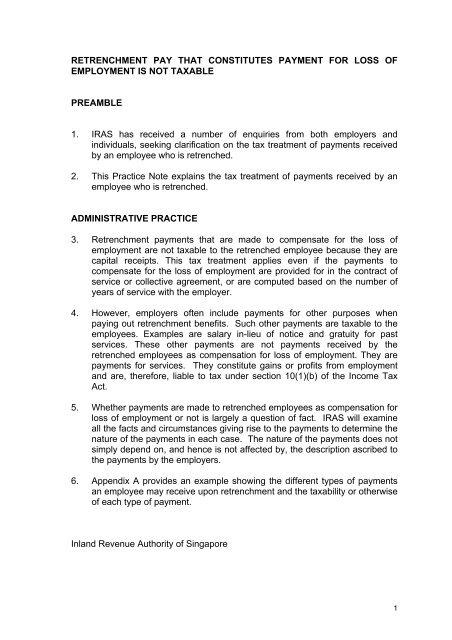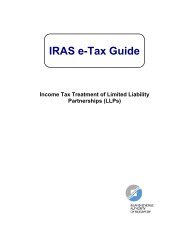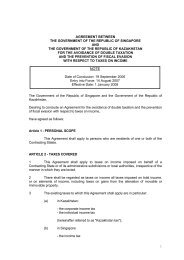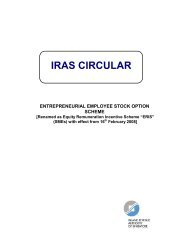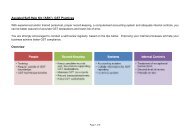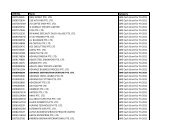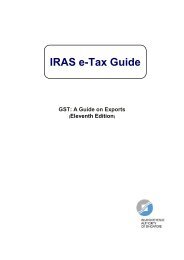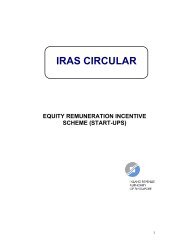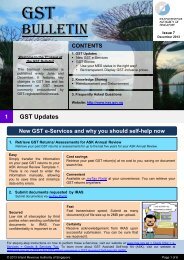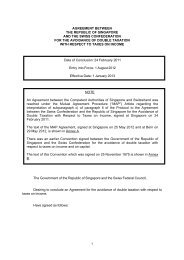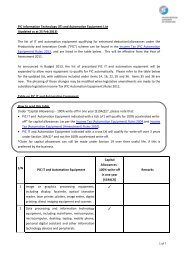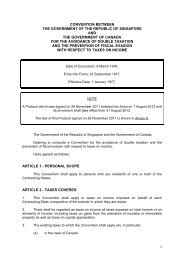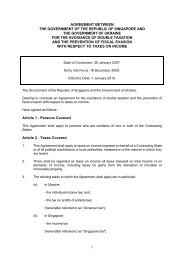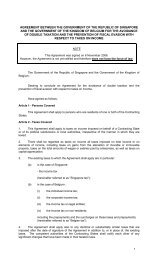retrenchment pay that constitutes payment for loss of ... - IRAS
retrenchment pay that constitutes payment for loss of ... - IRAS
retrenchment pay that constitutes payment for loss of ... - IRAS
Create successful ePaper yourself
Turn your PDF publications into a flip-book with our unique Google optimized e-Paper software.
RETRENCHMENT PAY THAT CONSTITUTES PAYMENT FOR LOSS OF<br />
EMPLOYMENT IS NOT TAXABLE<br />
PREAMBLE<br />
1. <strong>IRAS</strong> has received a number <strong>of</strong> enquiries from both employers and<br />
individuals, seeking clarification on the tax treatment <strong>of</strong> <strong>pay</strong>ments received<br />
by an employee who is retrenched.<br />
2. This Practice Note explains the tax treatment <strong>of</strong> <strong>pay</strong>ments received by an<br />
employee who is retrenched.<br />
ADMINISTRATIVE PRACTICE<br />
3. Retrenchment <strong>pay</strong>ments <strong>that</strong> are made to compensate <strong>for</strong> the <strong>loss</strong> <strong>of</strong><br />
employment are not taxable to the retrenched employee because they are<br />
capital receipts. This tax treatment applies even if the <strong>pay</strong>ments to<br />
compensate <strong>for</strong> the <strong>loss</strong> <strong>of</strong> employment are provided <strong>for</strong> in the contract <strong>of</strong><br />
service or collective agreement, or are computed based on the number <strong>of</strong><br />
years <strong>of</strong> service with the employer.<br />
4. However, employers <strong>of</strong>ten include <strong>pay</strong>ments <strong>for</strong> other purposes when<br />
<strong>pay</strong>ing out <strong>retrenchment</strong> benefits. Such other <strong>pay</strong>ments are taxable to the<br />
employees. Examples are salary in-lieu <strong>of</strong> notice and gratuity <strong>for</strong> past<br />
services. These other <strong>pay</strong>ments are not <strong>pay</strong>ments received by the<br />
retrenched employees as compensation <strong>for</strong> <strong>loss</strong> <strong>of</strong> employment. They are<br />
<strong>pay</strong>ments <strong>for</strong> services. They constitute gains or pr<strong>of</strong>its from employment<br />
and are, there<strong>for</strong>e, liable to tax under section 10(1)(b) <strong>of</strong> the Income Tax<br />
Act.<br />
5. Whether <strong>pay</strong>ments are made to retrenched employees as compensation <strong>for</strong><br />
<strong>loss</strong> <strong>of</strong> employment or not is largely a question <strong>of</strong> fact. <strong>IRAS</strong> will examine<br />
all the facts and circumstances giving rise to the <strong>pay</strong>ments to determine the<br />
nature <strong>of</strong> the <strong>pay</strong>ments in each case. The nature <strong>of</strong> the <strong>pay</strong>ments does not<br />
simply depend on, and hence is not affected by, the description ascribed to<br />
the <strong>pay</strong>ments by the employers.<br />
6. Appendix A provides an example showing the different types <strong>of</strong> <strong>pay</strong>ments<br />
an employee may receive upon <strong>retrenchment</strong> and the taxability or otherwise<br />
<strong>of</strong> each type <strong>of</strong> <strong>pay</strong>ment.<br />
Inland Revenue Authority <strong>of</strong> Singapore<br />
1
Appendix A<br />
Types <strong>of</strong> <strong>pay</strong>ments an employee may receive upon <strong>retrenchment</strong><br />
Types <strong>of</strong> <strong>pay</strong>ments Amount Tax treatment <strong>of</strong> <strong>pay</strong>ments<br />
Salary $ 10,000 Taxable<br />
Allowances $ 850 Taxable<br />
Pro-rated bonus $ 6,200 Taxable<br />
Commuted leave <strong>pay</strong> $ 2,800 Taxable<br />
Retrenchment benefits:<br />
Payment in lieu <strong>of</strong> notice<br />
Gratuity <strong>for</strong> past service<br />
Compensation <strong>for</strong> <strong>loss</strong> <strong>of</strong><br />
employment<br />
$ 4,200<br />
$ 10,510<br />
$ 36,750<br />
Taxable<br />
Taxable<br />
Non-Taxable 1<br />
Total $ 71,310<br />
________________________<br />
1 In determining whether the <strong>pay</strong>ment is made <strong>for</strong> the compensation <strong>of</strong> <strong>loss</strong> <strong>of</strong> employment or not, <strong>IRAS</strong> will<br />
examine all the facts and circumstances giving rise to the <strong>pay</strong>ment. Where the facts and circumstances<br />
clearly show <strong>that</strong> the <strong>pay</strong>ment is solely made to compensate the employee <strong>for</strong> the <strong>loss</strong> <strong>of</strong> employment, the<br />
<strong>pay</strong>ment is not taxable to the employee. However, where the facts and circumstances show <strong>that</strong> the<br />
<strong>pay</strong>ment is, say, made in appreciation <strong>of</strong> the employee’s past services, the <strong>pay</strong>ment is taxable to the<br />
employee. This is so regardless <strong>of</strong> how the employer may have described the nature <strong>of</strong> such <strong>pay</strong>ment.<br />
2


